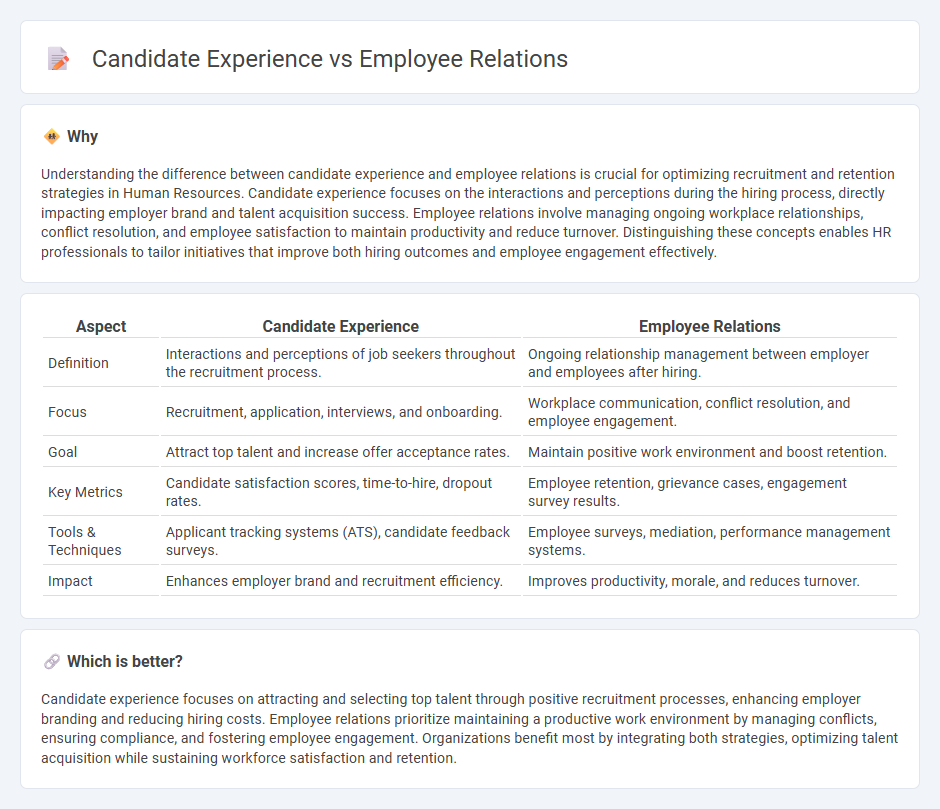
Candidate experience focuses on the interactions and impressions job seekers have during the recruitment process, directly impacting employer branding and talent acquisition success. Employee relations centers on maintaining positive workplace dynamics, addressing conflicts, and fostering employee engagement to enhance retention and productivity. Explore in-depth strategies to optimize both candidate experience and employee relations for a stronger organizational culture.
Why it is important
Understanding the difference between candidate experience and employee relations is crucial for optimizing recruitment and retention strategies in Human Resources. Candidate experience focuses on the interactions and perceptions during the hiring process, directly impacting employer brand and talent acquisition success. Employee relations involve managing ongoing workplace relationships, conflict resolution, and employee satisfaction to maintain productivity and reduce turnover. Distinguishing these concepts enables HR professionals to tailor initiatives that improve both hiring outcomes and employee engagement effectively.
Comparison Table
| Aspect | Candidate Experience | Employee Relations |
|---|---|---|
| Definition | Interactions and perceptions of job seekers throughout the recruitment process. | Ongoing relationship management between employer and employees after hiring. |
| Focus | Recruitment, application, interviews, and onboarding. | Workplace communication, conflict resolution, and employee engagement. |
| Goal | Attract top talent and increase offer acceptance rates. | Maintain positive work environment and boost retention. |
| Key Metrics | Candidate satisfaction scores, time-to-hire, dropout rates. | Employee retention, grievance cases, engagement survey results. |
| Tools & Techniques | Applicant tracking systems (ATS), candidate feedback surveys. | Employee surveys, mediation, performance management systems. |
| Impact | Enhances employer brand and recruitment efficiency. | Improves productivity, morale, and reduces turnover. |
Which is better?
Candidate experience focuses on attracting and selecting top talent through positive recruitment processes, enhancing employer branding and reducing hiring costs. Employee relations prioritize maintaining a productive work environment by managing conflicts, ensuring compliance, and fostering employee engagement. Organizations benefit most by integrating both strategies, optimizing talent acquisition while sustaining workforce satisfaction and retention.
Connection
Candidate experience shapes the initial perception of a company's culture, directly influencing employee engagement and retention rates. Positive candidate interactions establish trust and set expectations that impact long-term employee relations. Effective communication during recruitment fosters a supportive work environment, enhancing organizational commitment and performance.
Key Terms
Employee Relations:
Employee relations centers on fostering positive interactions, resolving conflicts, and ensuring workplace compliance to enhance employee satisfaction and productivity. Strong employee relations contribute to retention, engagement, and a harmonious work environment by addressing grievances and promoting transparent communication. Explore deeper insights into effective employee relations strategies to boost organizational success.
Workplace Conflict Resolution
Effective workplace conflict resolution enhances employee relations by fostering trust, communication, and collaboration among team members. Candidate experience, while primarily focused on recruitment, benefits from transparent conflict management practices that signal a positive organizational culture. Explore strategies to improve conflict resolution for stronger employee relations and a more attractive candidate experience.
Employee Engagement
Employee engagement hinges on effective employee relations, which foster trust, communication, and collaboration within the workplace, directly impacting productivity and retention rates. Candidate experience plays a crucial role by shaping early perceptions of the organization's culture and values, influencing future employee engagement from the onboarding stage. Discover how integrating strong employee relations and positive candidate experiences can elevate your workforce commitment and organizational success.
Source and External Links
Mastering Employee Relations - BambooHR - Employee relations is an organization's efforts to create and maintain positive relationships with employees by preventing and resolving disputes and enforcing fair policies between management and workers.
Employee Relations: Examples + 10 Strategy Tips - AIHR - Effective employee relations foster trust and appreciation between employees and employers, leading to better communication, higher morale, reduced conflict, and lower turnover.
Employee Relations: A Critical Area of HR Management - Pitt Law - Employee relations involves creating and maintaining positive connections between management and the workforce to improve communication, resolve conflicts, and build a positive workplace culture.
 dowidth.com
dowidth.com